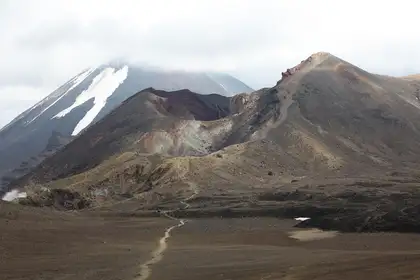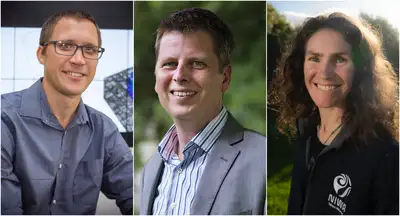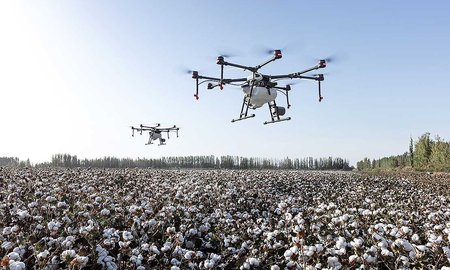
A Research Programme looking to develop a national volcano hazard model is among the successful projects.
Two Smart Ideas projects have received funding – one looking at mitigating mudflow disasters from flooding and the other developing sustainable manufactured and consumer hybrid foods. A Research Programme has also been awarded funding to develop a national volcano hazard model. The research impact from these projects will contribute to Aotearoa New Zealand’s ongoing climate change, food enhancement and disaster and risk management efforts.
Provost Professor Giselle Byrnes says the outcomes for Massey researchers are the result of great teamwork in preparing these funding applications and solid collaborations with stakeholders.
“Huge congratulations to these outstanding research teams who are advancing solutions to ‘real world’ challenges in areas that are critical for Aotearoa New Zealand. Finding ways to mitigate the effects of global warming, produce sustainable food and being better prepared to manage the impact of natural disasters are key to our national prosperity and wellbeing.”
Smart Ideas
More Than Water – a multiphase strategy towards mitigating climate-enforced mudflow disaster: Dr Stuart Mead and Professor Gert Lube, with Dr Emily Lane from NIWA.
The 2023 mudflow disasters following Cyclones Hale and Gabrielle made it clear that our communities, land and infrastructure are at risk from rapidly increasing climate change impacts. New Zealand does not currently have methods to assess the intensity of mudflow hazard impacts.
To fill this gap in our climate change mitigation strategy, Te Kunenga ki Pūrehuroa Massey University and the National Institute of Water and Atmospheric Research (NIWA) will partner with regional councils and iwi researchers to investigate the behaviour of geophysical sediment-water flows in the globally-unique large-scale geophysical mass flow facility PELE. They will then use the data captured to develop and confirm mudflow models that will help risk and disaster entities to predict the downstream impact and hazard intensity.
This will provide the missing tool for regional councils, hazard planners and decision makers to support mitigation for these destructive hazards.

From left: Dr Stuart Mead, Professor Gert Lube and Dr Emily Lane.
A circular food technology to create whole-plant food analogues: Professor Jaspreet Singh.
Existing plant-meat substitutes are ultra-processed and made up of refined high-fat ingredients. They also lack the fibrous texture and physical dimension consumers prefer in prime meat cuts. The manufacturing of plant-meat substitutes through harsh chemical extractions creates harmful waste that does not meet sustainable food manufacturing regulations.
New Zealand meat and dairy companies export high-quality protein-based food, but also produce low-value dairy proteins and meat cuts that don’t provide a high return. Professor Singh’s preliminary research discovered and patented a novel disruptive technology that can use these meat and dairy proteins to completely restructure them into ‘hybrid meat analogues’ that mimic prime meat cut textures. He also discovered that applying this co-processing technology has produced meat counterparts with a fibrous structure, when applied to less refined plant ingredients.
This project proposes further research to develop next-level food counterparts that fulfil the high standards required for sustainability claims in the near future.
Foods that meet the United Nations’ Sustainable Development Goals will be leading the global export markets. Professor Singh will continue to work with New Zealand's plant-based, meat and dairy companies to identify sustainable sources of unrefined ingredients and low-value animal proteins that can be used to create these products. He will also investigate the molecular-level interactions to better understand how plant ingredients constitute meat-like fibrous structures.

Professor Jaspreet Singh.
Research Programme
Te Awe Mapara, towards a National Volcano Hazard Model under climatic changes: Professor Mark Bebbington and Graham Leonard of GNS.
Protecting New Zealand from the consequences of future volcanic eruptions requires a National Volcanic Hazard Model (NVHM) future-proofed for environmental changes. Volcanic eruptions present a poorly understood danger to New Zealand from loss of lives and threats to our tourist and recreational industries, to the potentially $10 billion consequences of an Auckland eruption. We currently can only predict an increased likelihood of an eruption onset, but we can’t estimate ensuing hazards from that eruption.
An NVHM, underpinned by the critical gaps bridged in this programme, can then assemble past data and current monitoring to provide guidance on everything from personnel exclusion zones to the siting of critical infrastructure.
Using advanced simulation facilities, stakeholder engagement and probabilistic modelling, this research will deliver a clearer understanding of how hazards are initiated and evolve in response to environmental changes. It will focus on developing techniques to forecast hazards and impact rather than simply the onset of an eruption.
Building on iwi taiao monitoring strategies and frameworks with existing iwi partners from iwi-based volcano observatories, the programme will design a system for robust monitoring and decision-making around our co-governed volcanoes. Reducing uncertainty through revolutionary multi-hazard/multi-vulnerability and impact models will allow the nation to be better prepared.
This research will confirm New Zealand as an international leader in conceptualising and quantifying hazard and impact and continue to strengthen the knowledge and capacity of volcano advisory groups and Civil Defence Emergency Management groups to protect New Zealand.

Professor Mark Bebbington (left) and Graham Leonard.
Read more about the 72 projects funded by the Endeavour Fund here.
Related news
Funding awarded to bring transformational projects to life
Five projects led by Massey researchers, some involving co-leadership with partner entities, have been awarded more than $31 million from the 2023 Endeavour Fund.

Massey researchers awarded funding for impactful projects
In what is Massey's largest ever cohort, five research projects have been awarded Smart Ideas funding by the Ministry of Business, Innovation and Employment (MBIE).

MBIE funding awarded to researchers for innovative, cutting-edge projects
Four projects led by Massey University researchers have been awarded more than $12 million in the Ministry of Business, Innovation and Employment's (MBIE) 2021 Endeavour Fund.
